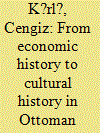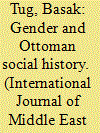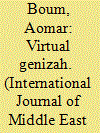| Srl | Item |
| 1 |
ID:
131567


|
|
|
|
|
| Publication |
2014.
|
| Summary/Abstract |
Reflecting on the state of Ottoman social history poses a paradox. On the one hand, it is impossible not to appreciate the great strides accomplished over the past three decades. Earlier approaches have been challenged, topics that were previously untouched or unimagined have been studied, and the foundations of a meaningful dialogue with historiographies of other parts of the world have been established. On the other hand, the theoretical sophistication and methodological debates of Ottoman social history still look pale compared to European and other non-Western historiographies in the same period.
|
|
|
|
|
|
|
|
|
|
|
|
|
|
|
|
| 2 |
ID:
131574


|
|
|
|
|
| Publication |
2014.
|
| Summary/Abstract |
Starting with Said's critique of Orientalism but going well beyond it, poststructuralist and postcolonial critiques of modernity have challenged not only one-dimensional visions of Western modernity-by "multiplying" or "alternating" it with different modernities-but also the binaries between the modern and the traditional/premodern/early modern, thus resulting in novel, more inclusive ways of thinking about past experiences. Yet, while scholars working on the Middle East have successfully struggled against the Orientalist perception of the Middle East as the tradition constructed in opposition to the Western modern, they often have difficulties in deconstructing the tradition within, that is, the premodern past. They have traced the alternative and multiple forms of modernities in Middle Eastern geography within the temporal borders of "modernity." However, going beyond this temporality and constructing new concepts-beyond the notion of tradition-to understand the specificities of past experiences (which are still in relationship with the present) remains underdeveloped in the social history of the Middle East.
|
|
|
|
|
|
|
|
|
|
|
|
|
|
|
|
| 3 |
ID:
133310


|
|
|
|
|
| Publication |
2014.
|
| Summary/Abstract |
After the establishment of the State of Israel, the Zionist narrative dominated the histories and historiographies of Middle Eastern and North African Jewries. Accordingly, Jews and Arabs were largely kept as distinct binaries divided by the intellectual walls that separated Middle East studies and Jewish studies programs. Local North African and Middle Eastern scholars also silenced or overlooked the Jewish dimension of Middle Eastern societies in the same manner that Israeli scholars ignored the historical connections between Arabs and Jews that existed both before and after 1948. The exclusive, sacred yet ebbing, nationalist paradigm has been plagued with historiographical fissures in recent decades, allowing a new wave of intellectual engagement by a young generation of Jewish and Muslim scholars who began to put the Jew and the Arab back into local and global histories formed through complex social, cultural, economic, and political networks.
|
|
|
|
|
|
|
|
|
|
|
|
|
|
|
|